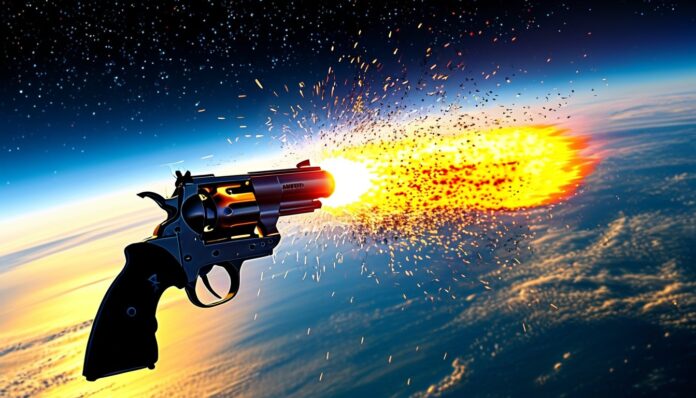In sci-fi movies, characters often fire guns in open space. But would a gun actually work in space, and what would happen if you fired one there? Let’s find out!
Firing in a Vacuum
Surprisingly, there haven’t been experiments to test whether an “earthly” gun would function in space. Researchers have differing opinions on this topic.
Some believe that the gun wouldn’t fire, as gunpowder requires oxygen to ignite. Without oxygen, there wouldn’t be an explosion of gunpowder, and therefore no shot. That’s why rockets powered by solid fuel are considered a more rational choice for space combat.
However, another view suggests that guns would work just fine in space. The small amount of oxygen in the gunpowder itself is enough to trigger a shot.
What Happens to the Bullet and Shooter After a Shot in Space?
According to Newton’s law, every action has an equal and opposite reaction. This is something every person who has fired a gun knows: the recoil is noticeable. On Earth, standing on solid ground, the recoil transfers through the body into the ground. A lightweight person might even fall after firing.
In space, where friction is minimal, both the bullet and the shooter would fly in opposite directions. The bullet would receive less momentum compared to an Earth-bound shot, as most of the energy would transfer to the shooter. If the shooter fires “from the shoulder,” the recoil would be unevenly distributed, causing the shooter not only to move in the opposite direction but also to spin rapidly. Without hitting something like a spaceship, the shooter could drift endlessly. This makes shooting in space extremely risky unless the shooter is anchored to a much larger object.
When Would the Bullet Stop?
A bullet fired in space would keep flying forever unless it hits an obstacle. This is because there’s no friction to slow it down. Of course, there’s a chance the bullet could be pulled toward a black hole. If that happens, its fate would be unpredictable since no one knows what happens to objects beyond the event horizon. However, the likelihood of colliding with a black hole is slim because the bullet wouldn’t have enough kinetic energy to “catch up” with such an enigmatic cosmic object.
If the shot is fired near a planet’s orbit, the bullet would interact with the planet’s gravitational field and follow a fixed trajectory. If the shooter stays in place, the bullet could eventually circle back and hit them from behind.
If the bullet is fired beyond the solar system, it might be pulled by Jupiter’s powerful gravitational field. This planet acts like a cosmic vacuum cleaner, gathering small objects like meteors around it.
Conclusion
Firing a gun in open space is risky business. It’s hard to say if the gun will even fire. If it does, the recoil could send the shooter flying in the opposite direction at great speed. So for space battles, lightsabers might be a more practical weapon!
